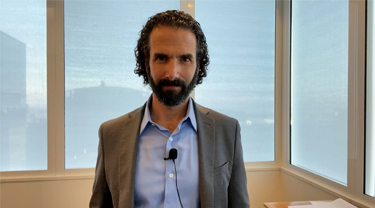

MyEDC account
Manage your finance and insurance services. Get access to export tools and expert insights.
Solutions
By product
By product
By product
By product
Insurance
Get short-term coverage for occasional exports
Maintain ongoing coverage for active exporters

Learn how credit insurance safeguards your business and opens doors to new markets.

See how portfolio credit insurance helped this Canadian innovator expand.
Guarantees
Increase borrowing power for exports
Free up cash tied to contracts
Protect profits from exchange risk
Unlock more working capital

Find out how access to working capital fueled their expansion.
Loans
Secure a loan for global expansion
Get financing for international customers
Access funding for capital-intensive projects

Find out how direct lending helped this snack brand go global.

Learn how a Canadian tech firm turns sustainability into global opportunity.
Investments
Get equity capital for strategic growth

Explore how GoBolt built a greener logistics network across borders.
By industry
Featured

See how Canadian cleantech firms are advancing global sustainability goals.

Build relationships with global buyers to help grow your international business.
Resources
Popular topics
Explore strategies to enter new markets
Understand trade tariffs and how to manage their impact
Learn ways to protect your business from uncertainty
Build stronger supply chains for reliable operation
Access tools and insights for agri-food exporters
Find market intelligence for mining and metals exporters
Get insights to drive sustainable innovation
Explore resources for infrastructure growth
Export stage
Discover practical tools for first-time exporters
Unlock strategies to manage risk and boost growth
Leverage insights and connections to scale worldwide

Learn how pricing strategies help you enter new markets, manage risk and attract customers.

Get expert insights and the latest economic trends to help guide your export strategy.
Trade intelligence
Track trade trends in Indo-Pacific
Uncover European market opportunities
Access insights on U.S. trade
Browse countries and markets
Get expert analysis on markets and trends
Discover stories shaping global trade
See what’s ahead for the world economy
Monitor shifting global market risks
Read exporters’ perspectives on global trade
Knowledge centre
Get answers to your export questions
Research foreign companies before doing business
Find trusted freight forwarders
Gain export skills with online courses
Get insights and practical advice from leading experts
Listen to global trade stories
Learn how exporters are thriving worldwide
Explore export challenges and EDC solutions
Discover resources for smarter exporting
About
Discover our story
See how we help exporters
Explore the companies we serve
Learn about our commitment to ESG
Understand our governance framework
See the results of our commitments
MyEDC account
Manage your finance and insurance services. Get access to export tools and expert insights.

Ian Tobman, manager of EDC’s Economic and Political Intelligence Centre, looks at three of the most common types of political risks, including real-world examples, and how you can manage and mitigate them.
In this blog post:
International trade can be a risky business at the best of times even in the most developed markets, but Canadian exporters need to be extra vigilant when venturing into emerging markets where the political risk may be more difficult to discern and deal with.
The challenge has become more pronounced as Canadian companies increasingly look to diversify their trade with faster growing emerging markets.
While political risk is unavoidable in the global marketplace, risk also comes with reward. These emerging markets are becoming major consumption hubs with attractive opportunities for Canadian businesses.
To better understand the impact that certain political risks can have on your business, let’s look at three of the most common types and real-world examples.
Political risk is unpredictable, but here’s how you can create a risk management program and policies to limit the potential negative effects.
This risk measures the likelihood of government action or weak governance conditions having a significant impact on a country’s commercial environment.
Real-world example: Following a coup attempt in 2016, the Turkish government targeted those domestic companies associated with the Gulen movement, which it claims was behind the attempt. The actions have included arbitrary impositions of regulatory requirements up to outright expropriation. The impact to Canadian companies has been that they have needed to add a further level of counterparty due diligence to any business dealings with Turkish companies to determine their relationship with the government.
EDC monitors the impacts of COVID-19 and the conflict in Ukraine on Canada and the global economy.
Measures the likelihood of a government imposing conversion or transfer restrictions, which would significantly affect the commercial environment.
Real-world example: Faced with an economic and financial crisis, Lebanon has been looking at formally instituting capital controls to conserve the limited foreign exchange reserves that remain in the country. This would significantly impede Canadian companies doing business in Lebanon to transfer funds out of the country.
Political violence is defined as any violent or hostile acts undertaken with the primary objective of either changing or overthrowing the government of the country or changing its policies.
Real-world example: A recent example of political violence is the conflict in Ukraine. Russia’s invasion of the country in early 2022 has significantly increased the risk to Canadian companies operating in Ukraine. Political violence can also take the form of social unrest as seen by recent events in Pakistan.
The impact of any one of these events on a Canadian exporter’s business is unlikely to be isolated or short-lived, and may ripple across the entire company, aggravating other types of risk all the way back to Canada.
So, how can Canadian exporters prepare for what may be sudden and unexpected political risks?
Trading in emerging markets can be daunting, which is why having a detailed plan and risk mitigation strategy in place from the outset is essential.
In this volatile market, safeguard your bottom line while keeping assets liquid with tools like EDC's FXG.

Despite downbeat outlook, Canadian companies shouldn’t sit on sidelines

Canadian exporters face tariffs, trade uncertainty and uneven growth across key sectors

How to protect your business against disruptions

EDC Economics identifies the challenges facing Canadian companies, including rising inflation, the energy crunch and war in Ukraine.